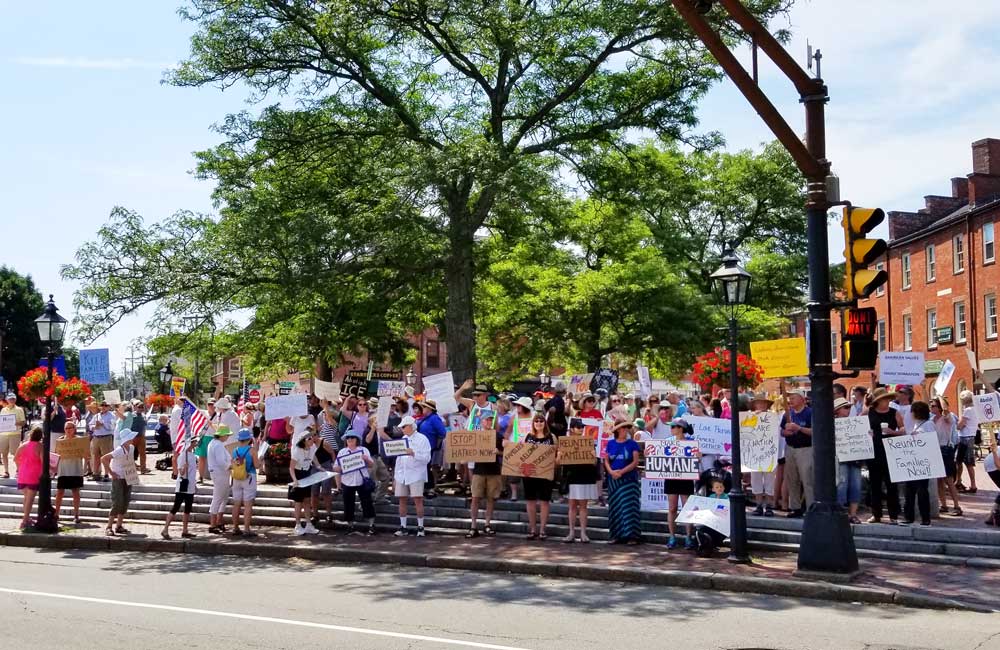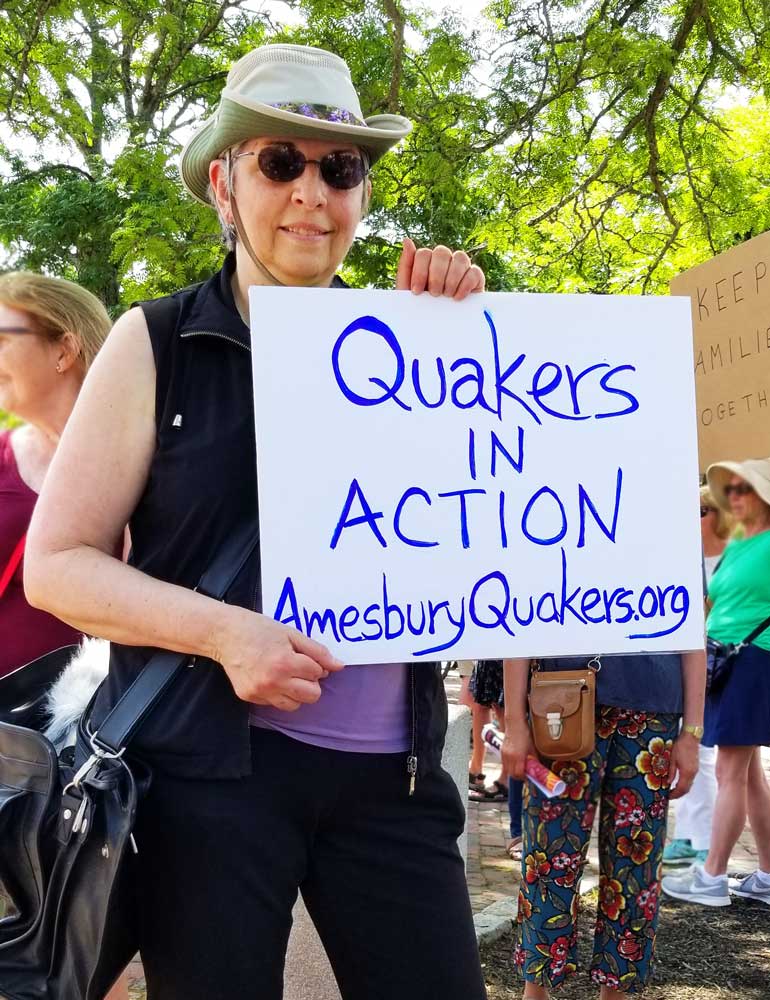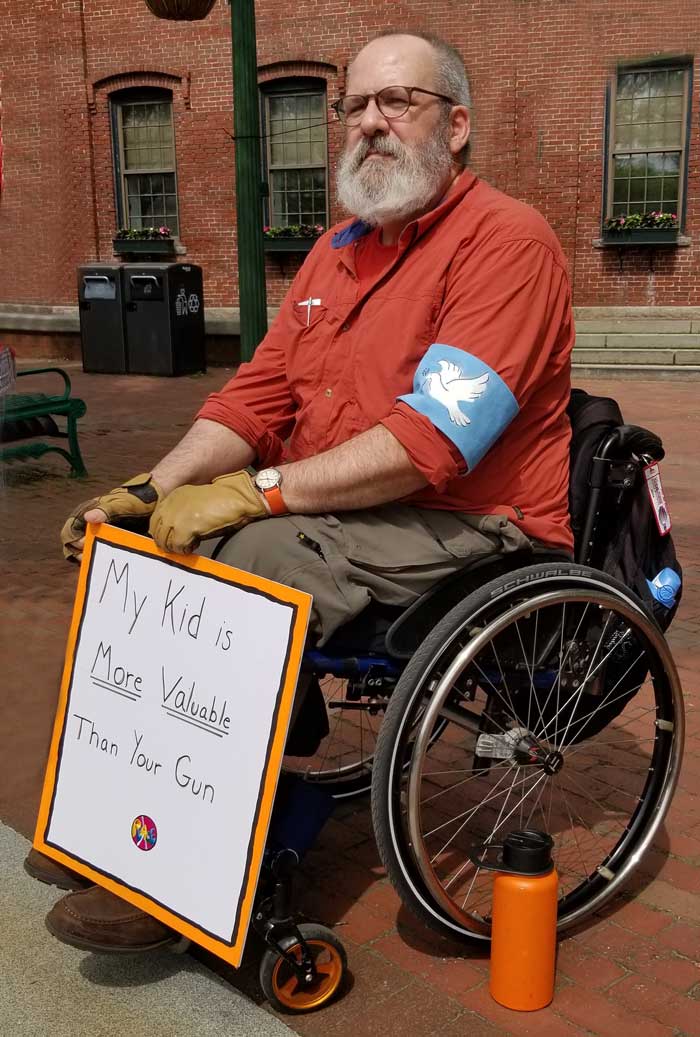Quakers have a long history of social justice activism. For Friends, this work is not simply an interest we share, but an expression of our faith – our way of living in alignment with the Quaker Testimonies.
We attend or organize local vigils and protests. We focus on issues of gun reform, equal rights, ending racism, ending violence against women, and more recently a range of immigration concerns. We join with other faith communities taking a stand against the recent brutal treatment of migrants and asylum seekers at the United States southern border.


Amesbury Friends Meeting member, Barbara Hildt served our local district as State Representative for five terms from 1983-1993. She was also one of the founders of our Amesbury Friends Peace Center that sponsors events to raise awareness, educate the public and open a dialogue on social justice issues.
In the informative piece below, Barbara encourages Friends and all activists to also take their messages directly to their local representatives. From her experience as a state legislator, she shares advocacy strategies and specific actions:
Influencing People Who Shape Public Policy
By Barbara Hildt, Amesbury Friends Meeting
Making the media and the public aware of our public policy concerns can be important. Organizing a silent vigil or rally that gets media coverage can help to raise public awareness of a cause. But if we want to have positive influence with the people who make the laws and shape policies, we need use truly effective methods of advocacy.
When I served in the Massachusetts legislature (1983-‘93), there were frequent demonstrations in front of the Statehouse. Rarely did I have the time to go out to see what they were for or against. Most demonstrators didn´t bother to enter the statehouse to visit the offices of their representatives or senators and drop off information about their concerns.
To advocate effectively for the preservation or modification of public policies, it makes sense to do things that enhance your chances of actually influencing the policymakers, without having to curry favor or make campaign contributions. Advocacy is not a single action. It usually requires a series of actions and a willingness to commit to the effort for least a few months, if not years. If you believe your cause is important and just, you might consider the methods I taught citizen advocates to use:
- Be prepared to present important facts orally and in writing. Cite sources and use bullet points.
- Always communicate respectfully with the policymaker. Call her/his office and ask to speak with a staff person who works on related issues. Identify yourself, share your concern and ask if the policymaker has a position on the issue. Provide your contact info and request a response in a letter or email from the policymaker. The numbers of names on petitions are noted, but personal phone calls and letters are much more influential.
- Build a coalition of individuals and groups who share your concern and core values. Meet and come to agreement on a strategic advocacy plan.
- Make an appointment to meet your representative or senator in their district where they have more time to listen to constituents without interruptions. Ask how much time you can expect to have for the meeting.
- Develop and maintain respectful relations with staff. Without them you have little chance of access to the policymaker or positive responses to requests.
- Get to know the person you want to influence. What issues does he/she care about most? Relate your issue to their concerns if possible.
- Before you meet with the policymaker, meet with those who will participate and agree on the points you need to make; the questions to be asked; and who will be the primary and secondary spokespersons for your group.
- For the meeting with policymaker, be prepared with clear, concise factual printed material and at least one powerful illustration of the need for the policy, such as a true story about a constituent.
- Avoid lecturing or making negative remarks about what you regard as the person’s past failings or mistakes. Focus on your hopes for the future. Ask how he/she might be helpful.
- Use your Power of Appreciation. Don´t end the meeting without recognizing and appreciating the policymaker’s service, citing some specifics. Express gratitude for the opportunity to meet, for their caring concern and willingness to help in any way, such as signing a letter to the president or sponsoring a bill.
This advice is shared in hopes that it may enhance your chances of influencing public policymakers like state legislators and members of the U.S. Congress. May it also serve as a reminder that all our relations, particularly with those we see as adversaries, benefit from our respect and empathetic listening.

Do you know the name and contact information of your State Representative?
How about your State Senator?
You can find that information here: https://openstates.org/
Rallies and Vigils are important. They bring us together with others who share our concerns and help build community.
Let’s take our activism to the next level!



